Archive for November 17th, 2010

Drinking and driving
Recently an acquaintance of mine pled guilty to DUI after driving into somebody. I do not know the details regarding what happened or whether the victim survived but what I do know is that she was over the legal alcohol limit while in control of her vehicle and that she hit an innocent pedestrian.
I was interested to see what comments she may have made relating to this incident on her Facebook page and was surprised to find a jolly and upbeat commentary ofher life including parties she has held recently and no mention of this terrible incident. There were also multiple messages from people telling her how wonderful she is and how they were all thinking of her. Now I know she must be going through a difficult time and be frightened for her future and hopefully remorseful of her actions. I understand that she may have been putting on a brave face – but I felt that some recognition of what happened – even a heartfelt apology to the victim would have been more appropriate. It is nice that her friends offer support; perhaps I am harsh but I cannot bring myself to muster much sympathy for anyone who has caused an accident because they drove a vehicle drunk.
I am tired of hearing every other week of single car accidents at night here in Cayman, where I have to assume the majority of them were caused by a driver unable to control their vehicle or react in a timely manner because they were under the influence of something. I shudder as I recall a dinner conversation with some girlfriends – 5 to be exact – and the subject got onto drink driving and every one of them laughed as they told stories about their narrow escapes from the law when they had been driving drunk or how “if you just try to stay between the lines you will be OK”. I was the only person at that table who not only doesn’t drive after drinking but views it totally unacceptable to risk other people’s lives by taking such frivolous risks.
I have been on the island for 7 years and am very aware that it is basically socially acceptable here to drive whilst over the limit. I have even spoken to people who say that when they lived in their home countries they never drove when drunk and have only started to here because everyone is so relaxed about it.
As far as I am concerned, no amount of alcohol when driving is safe. Those people who think that they can gauge their own sobriety as the night progresses should surely know that as they get increasingly drunk they will also believe that they are capable of anything and are less able to be a good judge of their own capabilities. How can anyone be such a fool as to think that alcohol does not affect them or that “it will never happen to them”? How can people, not even for one minute, imagine the consequences of an accident caused by their own inebriation or the devastating effect it would have on the lives of the innocent? I for one know that I could never forgive myself if I were to hurt another person or, worse, deprive a family of a loved one due to my own stupidity. The guilt would eat me alive.
I know I am at risk of sounding holier than thou – so be it. I simply want to put a message out there that driving under the influence is not acceptable. In fact it is utterly irresponsible. It is easy not to drink drive – set a limit on only one drink, or better still no alcohol … if you have more, take a cab. And no, getting into another car being driven by someone drunk does not make it any better. Please do not condone this behaviour – let people know that it is simply not OK. We cannot risk other people’s lives, for what? A quicker journey home and a few dollars saved. It simply isn’t worth it.
Prison to get non-lethal guns
(CNS): Government appears to have plans to arm local prison officers, according to a release from a Canadian firm which makes non-lethal weapons. Lamperd Less Lethal Inc has announced that the Cayman Islands will be buying the firm’s full line of ‘launchers’ and the less lethal AR/15 50 cal. with which to arm its prison officers. CNS has contacted the prison and the Portfolio of Internal Affairs to ask for more details on the plans to arm officers with these weapons and is awaiting a response. It is not known at this stage how many weapons have been purchased, who will use them and when. However, Lamperd said it had been working with Cayman for two years and officers have trained at the firm’s facility in the past.
The weapons manufacturer said it was pleased that Cayman had chosen its product line rather than the stun gun technology, which it said is associated with numerous deaths worldwide, while Lamperd’s products have caused zero deaths. The firm, which is based in Ontario, said it has 40 years experience in manufacturing police and military products and its patented Wasp round is composed of a specialized composite that allows the ammunition to maintain its properties over a wide range of temperatures, from 58 to 212 degrees F. It also dissipates energy, inflicting what the firm said was an adequate but not lethal trauma to the target, the firm claims.
Less lethal or non-lethal weapons are arms which fire rubber or wax bullets that are less likely to kill a victim, though they can still inflict serious harm. The firm said the weaponry is designed to ensure the safety of military and civil defence personnel by disabling an opponent rather than killing. It is used by military and police forces around the world for crowd control and peacekeeping activities. It is particularly well suited for situations where there would be a likelihood of harm to bystanders if conventional weapons were employed, the firm states on its website.
Lamperd said it has developed a line of exceptionally high quality launcher systems, which have gained widespread industry attention for their accuracy, ease of use and flexibility, and which the CIG has reportedly bought.
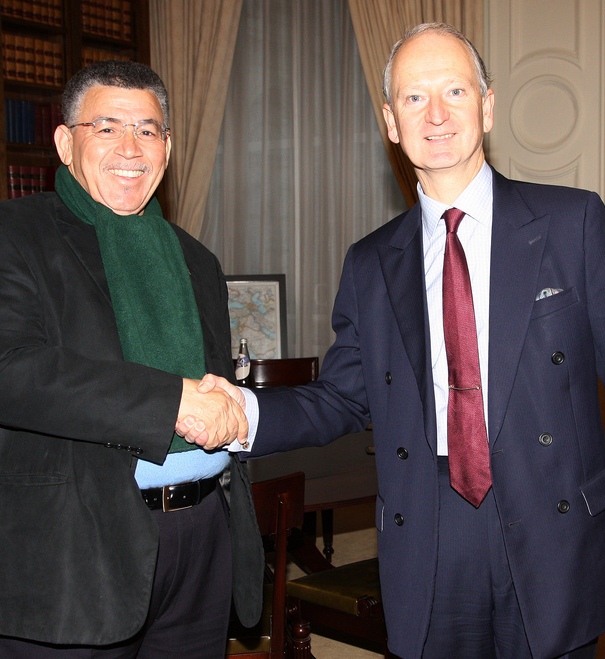
Premier talks fiscal prudence with OT minister
 (CNS): The Cayman Islands’ premier McKeeva Bush was in talks with the UK’s minister for overseas territories, Henry Bellingham MP yesterday ahead of the annual OTCC meeting in London which takes place today (Wednesday). The bilateral discussions covered what was described by officials as “mutual interest and concern” including the Cayman government’s commitment to reduce public spending. The FCO minister stated that he was interested to hear about the plan to make savings via the civil service review. The two men reportedly discussed Cayman’s three year budget plan and the importance of maintaining Cayman’s high standing and international reputation.
(CNS): The Cayman Islands’ premier McKeeva Bush was in talks with the UK’s minister for overseas territories, Henry Bellingham MP yesterday ahead of the annual OTCC meeting in London which takes place today (Wednesday). The bilateral discussions covered what was described by officials as “mutual interest and concern” including the Cayman government’s commitment to reduce public spending. The FCO minister stated that he was interested to hear about the plan to make savings via the civil service review. The two men reportedly discussed Cayman’s three year budget plan and the importance of maintaining Cayman’s high standing and international reputation.
According to a release from the governor’s office the UK minister congratulated the premier on Cayman’s success in achieving the standards of the OECD Anti-Bribery Convention, noting that it is the first Overseas Territory to have this Conventionextended to them.
“The Premier and I had a useful meeting and agreed on a timeframe for the development of a Framework for Fiscal Responsibility to embed fiscal discipline. I was interested to hear the Premier’s plans to implement savings through a review of the public service, and look forward to continuing our discussions at the OTCC tomorrow,” Bellingham said on Tuesday
Ahead of Wednesday’s meeting Bellingham said in an FCO release that the UK was seeking to reinvigorate it relationship with and have better risk management of the territories. The OT leaders and the UK government will be discussing , public finance; the environment; criminal justice; transport safety and security; and good governance during the council.
“I am delighted to welcome elected leaders from the Overseas Territories to this year’s Overseas Territories Consultative Council. Much has happened since Territory leaders gathered in London 12 months ago,” the OT minister said. “The UK government wants to develop a new strategy for the Overseas Territories which provides more effective support for their development and better risk management; one that involves, and is agreed by, the whole of UK Government.”
Bellingham added that the UK valued its ties with the Overseas Territories highly and was keen to maintain the bonds of friendship.
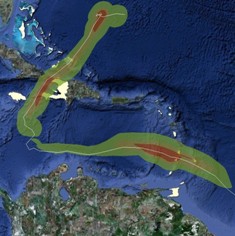
CCRIF pays out to islands hit by Hurricane Tomas
 (CNS): The regional insurance policy which covers countries in the Caribbean from natural and man made disasters in the Caribbean Catastrophe completed payments onWednesday to the governments of Barbados, Saint Lucia and St. Vincent & the Grenadines in the wake of Hurricane Tomas. The Caribbean Catastrophe Risk Insurance Facility (CCRIF), which is domiciled in the Cayman Islands, had released 50% of the payouts on 7 November week after the storm’s passage at the request of the three countries for urgent restoration of services. The total payouts for the three countries were Barbados – US$8,560,247; Saint Lucia – US$3,241,613 and St Vincent & the Grenadines – US$1,090,388.
(CNS): The regional insurance policy which covers countries in the Caribbean from natural and man made disasters in the Caribbean Catastrophe completed payments onWednesday to the governments of Barbados, Saint Lucia and St. Vincent & the Grenadines in the wake of Hurricane Tomas. The Caribbean Catastrophe Risk Insurance Facility (CCRIF), which is domiciled in the Cayman Islands, had released 50% of the payouts on 7 November week after the storm’s passage at the request of the three countries for urgent restoration of services. The total payouts for the three countries were Barbados – US$8,560,247; Saint Lucia – US$3,241,613 and St Vincent & the Grenadines – US$1,090,388.
Hurricane Tomas resulted in significant damage to the three islands, with Saint Lucian officials reporting that Tomas was “the worst in Saint Lucian history, destroying the island’s entire banana crop.” Across the three islands, roads and houses were damaged, power lines downed and the agriculture sector heavily impacted.
The three countries – along with 13 other Caribbean nations – have had catastrophe insurance for hurricanes and earthquakes with CCRIF since the inception of the Facility in 2007. CCRIF was formed at CARICOM’s request for a cost-effective risk transfer programme for member governments, and the insurance policies now form part of these countries’ disaster risk management frameworks.
CCRIF offers parametric insurance and therefore payouts can be calculated and made very quickly because there is no need to estimate damage after an event, the organisation stated in a release about the payout.
Payouts for tropical cyclones are determined based on government losses calculated using storm data from the National Hurricane Centre and parameters fixed within the loss estimation model used to underpin CCRIF’s policies. The model calculates the level of wind and ocean hazards, such as storm surge, encountered across the affected area and uses the pre-fixed value and distribution of government exposures to those hazards to calculate a loss.
The specific payout totals are based on the level of coverage a country has. Each individual country chooses its own coverage options in terms of the attachment point (deductible), exhaustion point (coverage limit), and premium. The amount of the premium then dictates how much of the risk between the attachment and exhaustion points they are actually covered for.
In the wake of Hurricane Paloma in 2008 questions were raised about the effectiveness of the policy in the Cayman Islands when there was no payout for Cayman Brac despite the devastation caused by the storm on that island. The policy covers the areas of economic activity and it was calculated that had Paloma hit Grand Cayman the payout could have been as much as $40 million.
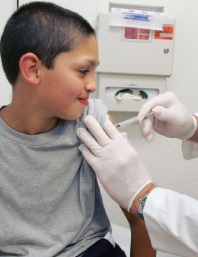
Minister warns of skepticism over vaccines
 (CNS): Despite huge health gains in the Caribbean region as a result of successful immunization programmes, outbreaks of certain viral diseases threaten to reverse those gains as a result of growing skepticism about vaccination, in the West the health minister noted at the start of the EPI conference this week being held in the Cayman Islands. Mark Scotland said the UK and the US had both reported a large numbers of measles cases because of a drop in MMR take-up rates. While Cayman still had high take up on vaccination rates he said experts were forced to be ever vigilant in the fight against communicable diseases.
(CNS): Despite huge health gains in the Caribbean region as a result of successful immunization programmes, outbreaks of certain viral diseases threaten to reverse those gains as a result of growing skepticism about vaccination, in the West the health minister noted at the start of the EPI conference this week being held in the Cayman Islands. Mark Scotland said the UK and the US had both reported a large numbers of measles cases because of a drop in MMR take-up rates. While Cayman still had high take up on vaccination rates he said experts were forced to be ever vigilant in the fight against communicable diseases.
“Apart from having to be ever vigilant against new and resurgent viruses, EPI managers are now also faced with a new battle – that of convincing a growing body of skeptical parents that vaccination is an act of love,” Scotland said in his opening address at the 27th Caribbean Expanded Programme on Immunisation (EPI) Managers’ Meeting on Tuesday. “This highlights the need for EPI managers to consistently engage the public, to answer their questions and address their fears.”
He told the delegates while they often work behind the scenes they were some of the most important people in the medical sector. “Medically speaking, this room holds some essential people who are all united by a vital ‘preventative maintenance’ mission,” the minister added.
The conference which is being held at the Marriot this week brings together experts from across the region to discuss the issues relating to vaccine programmes throughout the Caribbean which is celebrating its nineteenth year without an indigenous case of the measles and seven years without an indigenous case of rubella.
In the Cayman Islands, the minister revealed that after sixty years of immunization efforts polio, diphtheria, pertussis, neonatal tetanus, haemophilus influenza type b infections, mumps, measles, rubella, and TB meningitis have been eliminated.
Given that worldwide immunization programmes prevent more than three million deaths annually aside from preventing disease and sparing people the debilitating vaccinations also make sound economic sense, the minister said.
“A cost-benefit analysis in the United States indicated that for every dollar invested in a vaccine dose, authorities save up to US$ 27 in health expenses,” Scotland revealed. Regional studies exhibit the same trend: To treat a case of rotavirus gastroenteritis in Latin American and Caribbean countries costs an average of US$3,000 per patient, while the vaccination costs only US$24 per dose.”
He said that preventing communicable diseases, rather than treating and curing patients, can greatly reduce the strain on a country’s resources.
“If you asked public health professionals to name the top achievements of the past century, the answer would doubtless include immunization. And in the Caribbean specifically, expanded immunization programmes have relegated some of what were once feared diseases to today’s relatively minor maladies,” Scotland added as he revealed that between 90 and 95 percent of all infants are covered and 97 percent of children entering primary school get their vaccinations in the Cayman Islands. .
“Aware of the fact that any successful immunization programme must continually update and adapt, we recently introduced two new vaccines to the childhood vaccination schedule: The latest additions for infants are the rotavirus and pneumococcal vaccines, both of which were introduced in 2009. We also launched a pilot programme for the Human Papillomavirus vaccine, targeting females aged 11-17 years,” the minster said, adding that the next initiative was to add a second dose of the varicella (chickenpox) vaccine to the schedule at school entry and to organize a catch-up programme in January 2011.

Teen drunk-driver sent to jail for 15 months
 (CNS): Eighteen-year-old Brooke Nowak has been sentenced to fifteen months in jail for causing death while driving under the influence of alcohol following a car smash on the Esterley Tibbetts highway earlier this year, when Fedaranne Faustino was killed. Nowak pleaded guilty to the offence and surrendered her bail in September, aware she was likely to receive a jail term. Justice Smith disqualified the teenager from driving for five years on Wednesday morning as he handed down the 15 month jail sentence. Noting the aggravating factor that Nowak’s blood alcohol level was 1.8 when the legal limited is 1.0, the judge also noted mitigating factors including the remorse shown by the defendant and that she did not intend to kill anyone. (Photo Dennie WarrenJr)
(CNS): Eighteen-year-old Brooke Nowak has been sentenced to fifteen months in jail for causing death while driving under the influence of alcohol following a car smash on the Esterley Tibbetts highway earlier this year, when Fedaranne Faustino was killed. Nowak pleaded guilty to the offence and surrendered her bail in September, aware she was likely to receive a jail term. Justice Smith disqualified the teenager from driving for five years on Wednesday morning as he handed down the 15 month jail sentence. Noting the aggravating factor that Nowak’s blood alcohol level was 1.8 when the legal limited is 1.0, the judge also noted mitigating factors including the remorse shown by the defendant and that she did not intend to kill anyone. (Photo Dennie WarrenJr)
Fedaranne Faustino, who was 24-years old at the time of her death, was a passenger in the Honda Civic with which Nowak collided when she swerved into the opposite lane in her Toyota Land Cruiser in the early hours of the morning of 3August. The court heard there was no evidence that Nowak was driving dangerously or badly before the accident took place but that the crash was a result of her being under the influence of alcohol and driving her car into the path of the oncoming car.
The judge said that a custodial sentence was appropriate in the circumstances, not just to reflect the tragic death but to deter others from drinking and driving. However, Justice Smith discounted what would have been a three year sentence for the defendant’s early plea, her genuine sorrow and remorse and the fact that she was of good character with no previous convictions.
“Although there was a tragic loss of live we must not lose sight that the defendant did not intend to harm anyone,” the judge told the court. He noted the numerous character witnesses supplied to the court from the community on Nowak’s behalf, all of which indicated that the conduct surrounding this incident was uncharacteristic of the defendant and he did not believe she would be likely to offend again.
The judge said that Nowak’s time served since September will also count. The crown confirmed that it would not be appealing the sentence.
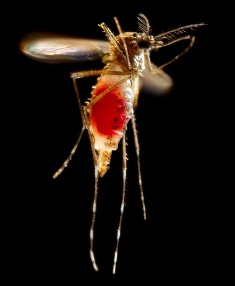
GM mosquito trial strains ties in Gates-funded project
 (Science/AAAS): About a year ago, genetically modified (GM) mosquitoes were released into the wild—and they have been flying under the world’s radar screen until last week. On 11 November, British company Oxitec announced that it carried out the world’s first small outdoor trial with transgenic Aedes aegypti mosquitoes in the Caribbean island of Grand Cayman in the fall of 2009, followed by a larger study there last summer. The trials were designed to test whether such designer mosquitoes could be successfully used to fight wild mosquitoes that transmit diseases like dengue fever. The announcement, made at a press briefing in London, has taken aback opponents of GM mosquitoes and surprised many researchers in the field of genetic control of insect vectors.
(Science/AAAS): About a year ago, genetically modified (GM) mosquitoes were released into the wild—and they have been flying under the world’s radar screen until last week. On 11 November, British company Oxitec announced that it carried out the world’s first small outdoor trial with transgenic Aedes aegypti mosquitoes in the Caribbean island of Grand Cayman in the fall of 2009, followed by a larger study there last summer. The trials were designed to test whether such designer mosquitoes could be successfully used to fight wild mosquitoes that transmit diseases like dengue fever. The announcement, made at a press briefing in London, has taken aback opponents of GM mosquitoes and surprised many researchers in the field of genetic control of insect vectors.
Some are questioning why the company stayed mum for so long, calling it a strategic mistake that provides critics of genetic modification with fresh ammunition. "I don’t think they did themselves a favor," says Bart Knols, a medical entomologist at the University of Amsterdam. "This could well trigger a backlash."
Luke Alphey, chief scientific officer of Oxitec, says he "completely rejects" the notion that there was anything secretive about the trial, which was well-known within the island’s population of 50,000, he says, "but just not picked up internationally."
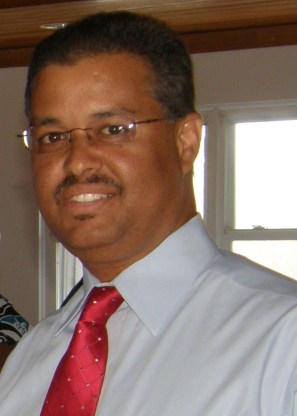
Chuckie calls for referendum on key issues
 (CNS): The former PPM member and Minister for Tourism, Charles Clifford has called on the UDP government to allow the people to vote on the proposed East End Seaport, the national conservation law, the election cycle as well as the competence of the government and the premier when it holds its referendum on gambling next year. In a statement released to the press on Tuesday Clifford says that given the cost of a referendum could be as much as $600,000 the opportunity should be used to gage the feelings of the people on other important issues. He said the people of the Cayman Islands were angry over a number of UDP policies and the referendum would give them a voice.
(CNS): The former PPM member and Minister for Tourism, Charles Clifford has called on the UDP government to allow the people to vote on the proposed East End Seaport, the national conservation law, the election cycle as well as the competence of the government and the premier when it holds its referendum on gambling next year. In a statement released to the press on Tuesday Clifford says that given the cost of a referendum could be as much as $600,000 the opportunity should be used to gage the feelings of the people on other important issues. He said the people of the Cayman Islands were angry over a number of UDP policies and the referendum would give them a voice.
“If we are going to have one on gambling then there are several other topical issues and questions of national importance that ought to be tested during the upcoming referendum,” Clifford said in his statement. “The people are looking for a voice and solutions in the midst of these difficult times and in the absence of our elected leaders providing that voice and the required solutions for our people let us give our people an opportunity through this referendum to speak for themselves.”
Clifford called on the people to apply pressure on government by calling in to the talk shows, writing letters to the newspapers, posting on blogs and “through any other lawful means that are available to ensure that these additional questions appear on the upcoming referendum,” he said.
See full statement in CNS Viewpoint column

Extended referendum required
The Premier has announced that the anticipated November 2010 referendum on gambling has been delayed until the first quarter of 2011. If we can afford to hold a referendum at this time then perhaps it is time that as a country we settle this question once and for all by giving our people the right to vote for or against legalizing gambling in the Cayman Islands.
During the 2005 – 2009 administration, of which I was a part, we had plans to hold a referendum in midterm to give our people the opportunity to vote for or against the new draft Cayman Islands Constitution. We asked the Elections Office, as the agency that would conduct the referendum, for an estimate on the cost of holding such a poll. At that timewe were advised that it would cost CI$500,000 – CI$600,000 to conduct as it had to be organized and executed along similar lines as general elections. As it turned out, the referendum on the constitution was held during the general elections and so the cost was probably significantly less due simply to the timing of the referendum.
But the point is that a referendum is not an inexpensive exercise and if we are going to have one on gambling then there are several other topical issues and questions of national importance that ought to be tested during the upcoming referendum.
It is obvious that there has been widespread discontentment in Cayman for the past year and most people are very angry as a result of the UDP Government’s flawed economic and immigration policies. The constant increases in taxes since 2009 are causing some businesses to close and many jobs are being made redundant. The effect of this is less money circulating in our economy, thereby exacerbating the impact of the global economic recession on our local economy. To make matters worse, Caymanians are being marginalized in our own country due to fundamentally flawed immigration policies. Collectively these issues are very clearly a recipe for social disharmony and civil disorder, which we must make every effort to avoid for obvious reasons. The people are looking for a voice and solutions in the midst of these difficult times and in the absence of our elected leaders providing that voice and the required solutions for our people let us give our people an opportunity through this referendum to speak for themselves.
Additionally, the critically important draft National Conservation Law has been in various stages of draft form for well over 8 years and has not been passed by the Legislative Assembly because of organized special interests objections to it. It is time to settle this matter once and for all by giving our people the choice in this upcoming referendum.
The issue of the proposed East End port is a national issue, and while it will directly impact the people of East End, it also has significant implications for the entire country and ought to be considered and decided by the people. The proposed East End port completely disregards the Go East Policy document, which was approved by the Cabinet of which I was a part and which I tabled in the Legislative Assembly along with the current Tourism Management Policy. The Go East Policy has at its core sustainable tourism development for the eastern districts. This policy document was developed after extensive consultations through district forums, which I hosted for the people of Bodden Town, East End and North Side. During those consultations the people of the eastern districts made it abundantly clear that they did not want their districts to become industrialized but instead expressed a desire to focus on their environment, culture and heritage, cottage style tourism development and they requested, as an example, that in the future hotels and condos not exceed three floors in height.
Likewise the issue of dredging a deep water channel in the North Sound willnot only impact the North Sound tour operators but, given the significant implications for some of our prime tourism attractions in the North Sound, it has the potential to negatively impact the wider tourism industry.
I am well aware that as a people we have the ability to initiate a referendum under section 70 of our new 2009 Cayman Islands Constitution but here is an opportunity for the Government to save some money by including these other questions of national importance in the upcoming referendum and avoid the probability of having to hold two referendums and doubling the costs.
If the UDP Government is confident that their policies are right for the country and that they enjoy the confidence of the people, they ought to have no concerns about asking the following additional questions on the upcoming referendum on gambling and I publicly call on them to do so:
1. Do you have confidence in the UDP Government’s ability to effectively manage the affairs of our country during what are the most challenging economic times since the 1930’s? – Yes / No
2. Do you have confidence in Premier McKeeva Bush’s ability to lead the government and country during these difficult and complex times? – Yes / No
3. Do you support moving our general elections cycle back to the month of November with the next general elections being held in November 2012? – Yes / No
4. Do you support moving our general elections cycle back to the month of November with the next general elections being held in November 2013? – Yes / No?
5. Should the government debate and approve in the Legislative Assembly the draft National Conservation Law as a matter of urgency? – Yes / No
6. Do you support relocating the cargo port to East End and the related development as proposed? – Yes / No
7. Do you support dredging a deep water channel in the North Sound to accommodate mega yachts? – Yes / No
These are seven simple questions that require a yes or no answer and this approach would settle these matters once and for all . The results of the referendum would determine in true democratic fashion the way forward during these difficult times.
I encourage everyone to apply pressure on our government by calling in to the talk shows, writing letters to the newspapers, posting on blogs and through any other lawful means that are available to ensure that these additional questions appear on the upcoming referendum.

PM removes ‘vanity staff’ from Downing Street payroll
 (The Guardian): David Cameron performed the sharpest U-turn of his premiership today, removing his former personal photographer and a filmmaker from the public payroll after intense criticism about the appointment of his so-called "vanity staff" to the civil service. Downing Street acknowledged that the transfer of Andrew Parsons, Cameron’s photographer, and Nicky Woodhouse, the filmmaker behind WebCameron, to the civil service "sent out the wrong message". The prime minister’s official spokesman was later forced to defend the timing of the announcement, 20 minutes before the engagement of Prince William and Kate Middleton was revealed, after accusations that No 10 had hoped to bury a bad news story.
(The Guardian): David Cameron performed the sharpest U-turn of his premiership today, removing his former personal photographer and a filmmaker from the public payroll after intense criticism about the appointment of his so-called "vanity staff" to the civil service. Downing Street acknowledged that the transfer of Andrew Parsons, Cameron’s photographer, and Nicky Woodhouse, the filmmaker behind WebCameron, to the civil service "sent out the wrong message". The prime minister’s official spokesman was later forced to defend the timing of the announcement, 20 minutes before the engagement of Prince William and Kate Middleton was revealed, after accusations that No 10 had hoped to bury a bad news story.